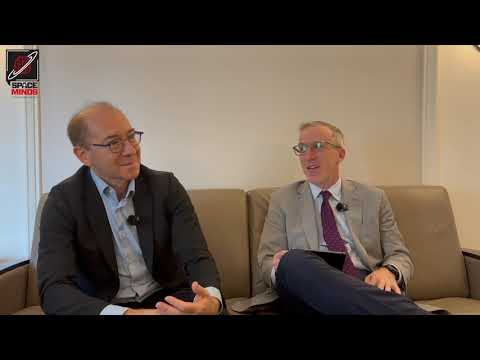In this week’s special CEO Series edition of Space Minds, we’re at the World Space Business Week in Paris. In today’s episode, SpaceNews editor Mike Gruss talks with Pacome Revillon, CEO of Novaspace.
They discuss the accelerating race in direct-to-device satellite communications, the surge in defense spending and dual-use technologies, and the growing role of sovereignty in global space strategies. Revillon also shares insights on consolidation trends within the industry, the future of AI in space applications, and predictions for what’s ahead in launch and defense markets.
sponsored by
BlackSky empowers defense leaders to see, understand and anticipate change with real-time space-based intelligence. Access on-demand, high-frequency satellite imagery, analytics and dynamic monitoring of the most strategic and critical locations in the world so you can detect threats, verify actions and adapt strategy faster than ever before. Visit blacksky.com to learn more.
Show notes and transcript
Click here for Notes and Transcript
Time Markers
00:00 – Episode introduction
00:58 – Welcome
01:26 – Themes this week
02:41 – Direct-to-Device (D2D) Race
04:52 – Market Scale & Users
06:12 – Defense & Dual-Use Technologies
08:56 – Winners & losers
10:23 – Space Economy
12:32 – Investors & Consolidation
14:16 – China
16:03 – Artificial Intelligence
19:02 – Looking Ahead
Transcript – Pacome Revillon Conversation
This transcript has been edited-for-clarity.
Mike Gruss – Welcome to the Space Minds Podcast, in partnership with BlackSky. I’m Mike Gruss from SpaceNews, here in Paris at World Space Business Week. We’ve had a series of CEOs and leaders join us, and today is no different. I’m here with Pacome Revillon, CEO of Novaspace. Pacome, thanks for joining us. It’s been a busy week—what themes have you noticed repeated across the conferences?
Pacome Revillon – It’s been an extremely busy week, but a few themes stand out. Direct-to-device communications are accelerating, with new partnerships announced almost daily. We’re also seeing consolidation in the commercial sector, and a renewed focus on sovereignty—how governments balance their own capabilities with industry collaboration. On the defense side, discussions are about managing the transition period while preparing armed forces for the future.
Mike Gruss – Let’s start with direct-to-device. Is this really a race? We’ve seen deals from EchoStar and SpaceX, as well as Viasat and Space42, marketing themselves as alternatives for governments that want sovereignty and control. How do you see this race shaping up?
Pacome Revillon – It’s accelerating quickly. The first battle is over spectrum—whether companies partner with mobile operators or build their own networks. Beyond that, the competition is about moving from simple messaging to true broadband-like connectivity. And it’s not just about consumers; sovereignty and defense applications make direct-to-device strategically important for the decade ahead.
Mike Gruss – When you spoke earlier this week, you mentioned 300 million potential users. Is that a realistic number?
Pacome Revillon – Yes. If mobile operators integrate these services seamlessly, adoption could grow very fast, reaching hundreds of millions by the end of the decade. Building independent spectrum networks will take longer, since manufacturers like Apple and Samsung need to adapt devices. Regulation and orbital deployments will also affect growth.
Mike Gruss – Let’s talk about defense. Where do you see the market, especially outside the United States?
Pacome Revillon – Defense budgets are rising globally due to geopolitics. Many countries have pledged significant increases. Space is shifting from being a strategic planning tool to providing real-time, tactical capabilities. Governments need to decide which capabilities to keep sovereign and which to develop in partnership with industry. That’s driving new acquisition models and joint projects.
Mike Gruss – Who are some of the winners and losers in this shift?
Pacome Revillon – It’s too early to call winners, but some European companies have already secured multiple defense contracts. Remote sensing demand surged recently, then paused while awaiting new budgets. Governments will soon need to pick and scale the startups and technologies they see as most critical.
Mike Gruss – You also talked about the size of the space economy—$596 billion now, on track to $944 billion by 2033. Why does that number matter?
Pacome Revillon – It shows the growing economic and societal importance of space. For governments, it’s a way to measure impact. For companies, it highlights opportunities to move up the value chain, whether through satellites, terminals, or end-to-end services. No company can cover the whole economy, but each can expand their share.
Mike Gruss – From an investor standpoint, where do you see opportunities for consolidation, mergers, and acquisitions?
Pacome Revillon – We’ve already seen over 50 space transactions per year. Spectrum deals, manufacturing mergers, the SES-Intelsat deal—all point to a trend. Many companies are now eight to ten years old, and scale is essential. I expect more consolidation over the next two to three years across different segments of the industry.
Mike Gruss – I was surprised we didn’t hear more about China this week. What’s your view?
Pacome Revillon – China is advancing quickly across every domain—exploration, defense, commercial services. While not openly discussed, it’s a major driver behind sovereignty concerns and industrial competition worldwide. Chinese companies are increasingly active in global markets, which will intensify competition.
Mike Gruss – AI is another hot topic. Where are we on AI in space, and how is it changing?
Pacome Revillon – The most advanced applications are in remote sensing analytics. Trust and reliability are still issues for critical missions, but companies are testing AI in design and industrial processes. Adoption will grow gradually. The next generation of engineers already uses AI heavily, so industry must adapt. Over time, AI will transform space, even if we can’t fully predict what assets will look like in 2035 or 2040.
Mike Gruss – Last question: give me a bold prediction for next year’s World Space Business Week.
Pacome Revillon – Launch will be the hot topic—new architectures require reliable access to space, and systems like Starship will be central. We’ll also see more mergers and acquisitions, and today’s defense budget commitments will start turning into real procurements.
Mike Gruss – Pacome, thanks so much for joining us. And thanks to our partner BlackSky for supporting this podcast. All of our coverage from World Space Business Week is available at SpaceNews.com.
About Space Minds
Space Minds is a new audio and video podcast from SpaceNews that focuses on the inspiring leaders, technologies and exciting opportunities in space.
The weekly podcast features compelling interviews with scientists, founders and experts who love to talk about space, covers the news that has enthusiasts daydreaming, and engages with listeners. Join David Ariosto, Mike Gruss and journalists from the SpaceNews team for new episodes every Thursday.
Watch a new episode every Thursday on SpaceNews.com and on our YouTube, Spotify and Apple channels.
Be the first to know when new episodes drop! Enter your email, and we’ll make sure you get exclusive access to each episode as soon as it goes live!
“*” indicates required fields
Note: By registering, you consent to receive communications from SpaceNews and our partners.
Related

